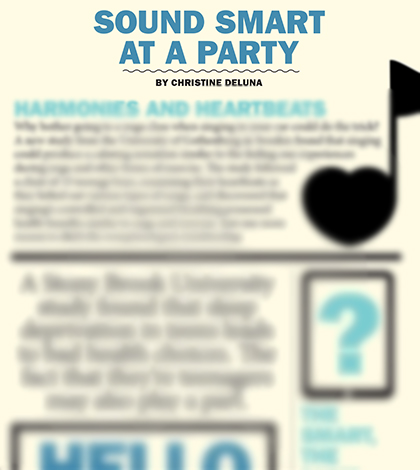 HARMONIES AND HEARTBEATS
HARMONIES AND HEARTBEATS
Why bother going to a yoga class when singing in your car could do the trick? A new study from the University of Gothenburg in Sweden found that singing could produce a calming sensation similar to the feeling one experiences during yoga and other forms of exercise. The study followed a choir of 15 teenage boys, examining their heartbeats as they belted out various types of songs, and discovered that singing’s controlled and organized breathing possessed health benefits similar to yoga and exercise. Just one more reason to ditch the overpriced gym membership.
A Stony Brook University study found that sleep deprivation in teens leads to bad health choices. The fact that they’re teenagers may also play a part.
HELLO
Just when we thought we’d mastered ways to say “hello” in enough languages to get through a trip around the world, out comes one more. University of Michigan linguist Carmel O’Shannessy discovered a language spoken in Lajamanu, a remote Australian desert town of little more than 800 residents. It’s a mixture of English, Walpiri, the area’s original indigenous language, and Kriol, an English Creole. Dubbed Light Walpiri, it’s spoken by 350 residents—all under the age of 35. Perhaps Lajamanu developed as a means of trash-talking parents while standing right in front of them?
Man of Steel Superman’s weakness, Kryptonite—the pulsating green ore from the inner depths of the planet Krypton—was inspired by the Earth element krypton, a noble gas discovered in 1898 by British researchers William Ramsay and Morris Travers.
DARK LIGHTNING
Thunderstorms work like massive natural terrestrial particle accelerators. Besides producing the bright flashes of electricity, they also create intense sub-millisecond bursts of gamma rays and particle beams of matter and anti-matter. This invisible radiation is referred to as “Dark Lightning.” Its exposure effects on airplane crews and passengers are currently under investigation.
THE SMART, THE DUMB AND THE TABLET OWNER
 There’s always “that guy” at a party who tries to impress everyone with “I read this article on my iPad about…” For those keeping score, “that guy” thinks he’s smarter than you. But, in a poll of 1,000 people by Wakefield Research, 56 percent of tablet owners believed they knew more about current events than their friends. While they might think they’re smarter, 52 percent of tablet users polled admitted to faking their knowledge of current events to impress their friends. Even with all of this in mind, 70 percent of all those polled admitted to seeking out arguments about current events with friends—politics being the most popular subject. It all makes sense now. So next time “that guy” starts spewing his tablet factoids, ask him if he’s 52 percent sure he’s telling the truth.
There’s always “that guy” at a party who tries to impress everyone with “I read this article on my iPad about…” For those keeping score, “that guy” thinks he’s smarter than you. But, in a poll of 1,000 people by Wakefield Research, 56 percent of tablet owners believed they knew more about current events than their friends. While they might think they’re smarter, 52 percent of tablet users polled admitted to faking their knowledge of current events to impress their friends. Even with all of this in mind, 70 percent of all those polled admitted to seeking out arguments about current events with friends—politics being the most popular subject. It all makes sense now. So next time “that guy” starts spewing his tablet factoids, ask him if he’s 52 percent sure he’s telling the truth.




























